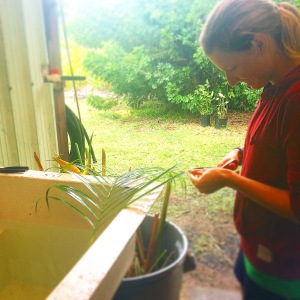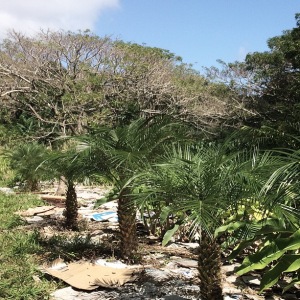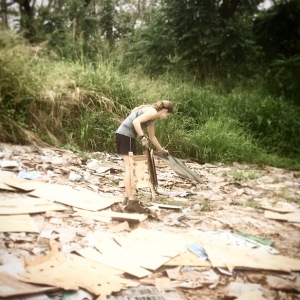Organic. We see this word everywhere nowadays. It’s in our supermarkets, our cosmetics, even our clothing stores have started carrying organic fabrics. We get excited when we see something labeled as organic or sustainable, and while all that sounds great, we have to ask, what does being organic really mean?
As you know, we run an organic operation here at Hana Tropicals, but we do it for more than just the pride of being able to stamp the organic label on our products. For us, being organic is a lifestyle, a practicality, and an absolute necessity to ensure the future of our business and our home.
But why? Couldn’t we be just as productive and successful if we skipped the whole organic thing just used herbicides, pesticides, and chemical treatments on our flowers? Well, not exactly…
One of the biggest challenges we face here on Maui is our soil. We have about 3 inches of usable soil here on the farm, and everything underneath that is essentially a sheet of lava rock. If we used chemicals to ward off the weeds and pests, we would be really happy in the short term (not to mention it would cut our workload in half!), but after about a year or so the nutritional value of our soil would begin to rapidly deplete, making flower growing extremely difficult if not impossible.
But then that begs the question – how can we possibly keep up with demand without the assistance of chemical treatments? The answer – creativity!
For anyone who has visited our farm (and we invite you to come see us when you are in Maui!), our fields look anything but traditional. That’s because we have covered them in cardboard. Wait – cardboard? Yes, local businesses bring us their endless supply of leftover cardboard for us to cover our fields with. We use cardboard because it keeps the weeds at bay by providing a barrier between the existing soil and the sunlight, and over time, it will decompose and become part of the soil itself. A win-win!

As for the bugs and critters, each flower gets washed and inspected, by hand, in a solution of water and Dawn dishwashing detergent. This stuff is great because it’s biodegradable and doesn’t ruin the flowers. So although it can take up to 15 minutes to clean just one flower (and no, that is not an exaggeration), we’d rather spend the extra time and care now than deal with a much bigger problem on our hands down the road (besides, once we’re working together and cranking the tunes, the time flies by!).
Here at Hana Tropicals we constantly have to look at the big picture – yes, inorganic methods of farming might benefit us now, but certainly not in the long run. And though it can seem like a lot more work to maintain this organic way of farming, we know it is the right choice for us, and it will benefit from it for years to come.
What can you do at home to reduce your carbon footprint?
Here are 5 ways to get started…
- Support your local Farmer’s Market. Buy local, buy organic. Get to know where your food comes from and the people making it all happen behind the scenes.
- Choose organic. Your dollar is your vote, and when you support organic and sustainable brands, you’re telling producers you like their product and their message, and want to see more.
- Start a garden. It doesn’t have to be that big, even growing a few herbs at home can make a huge difference. There are so many different ways to create in-home, easy to care for gardens – just take a look at Pinterest and you’ll see what we mean!
- Invest in a reusable water bottle. The average American consumed about 167 bottles of water last year. So you can see the difference even one person can make by simply using a reusable water bottle. The planet and your wallet will thank you.
- Turn off the lights. This one may seem like a no brainer, but it’s not always so obvious to us. If you can’t remember to turn off the lights, perhaps consider investing in a motion timer that will switch off the lights when no one is in the room (check your local hardware store or online for the best deals!). A little bit goes a long way, and you will love the difference you see in your electric bill!
Have you made any changes in your life to increase sustainability and reduce your carbon footprint? We want to know! Tag us know on Facebook or Instagram @HanaTropicals with your green tips and tricks! Aloha!



